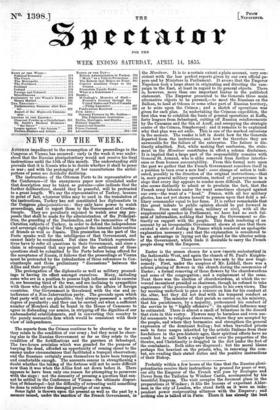Some light is thrown upon the present as well as
the past by a memoir issued, under the sanction of the French Government, in
the Moniteur. It is to a certain extent a plain account, very con- sistent with the less perfect reports given by our own official pa- pers and by Ministers in Parliament. It avows that the Emperor Napoleon took a large share in originating and directing the cam- paign in the East, at least in regard to its general objects. There is, however, more than one important hiatus in the published statement. The Emperor presented to the Generals three main alternative objects to be pursued,—to meet the Russians on the Balkan, to land at Odessa or some other part of Russian territory, or to seize upon the Crimea ' • and a sketch of operations was given for each plan. In undertaking the Crimean expedition, the first idea was to establish the basis of general operations at Kaffa, forty leagues from Sebastopol, cutting off Russian reinforcements by the Caucasus and the Sea of Azoff, and occupying the strategic centre of the Crimea, Simpheropol: and it remains to be explained why that plan was set aside. This is one of the marked omissions in the memoir. The reader is left in doubt how far the Generals departed from the instructions, and how far therefore they are answerable for the failure of the enterprise. The failure is dis- tinctly admitted. But, while making that confession, the state- ment in the lifoniteur constitutes in effect a solemn disclaimer. It is implied that a large part of the responsibility remains with General St. Arnaud, who is alike removed from further interfer- ence or from human accountability. From this formal note upon the past we gather that the French Government considers itself in a position to turn over a new leaf : some change of action is indi- cated, possibly in the direction of the original instructions,—that is, more general military operations, instead of perseverance in a siege that every day appears to render more difficult. The memoir also seems distinctly to admit or to proclaim the fact, that the French army labours under the want sometimes charged against our own—the want of a " head." France, with all her military glories, has not yet shown herself to possess upon that field a mi- litary commander equal to her fame. It is rather remarkable that this great tribute to public opinion should be put forward in France. From our official men, military or civil, with all the supplemental speeches in Parliament, we have had no such ful- ness of information, nothing that brings the Government so dis- tinctly en rapport with the people. This frank rendering of an account by an irresponsible Government shows at once that there existed a state of feeling in France which rendered an apologetic explanation necessary ; and that the explanation is considered to be an advantage in laying out the ground for the ulterior action of the Government, which finds it desirable to carry the French people along with the Emperor.


























